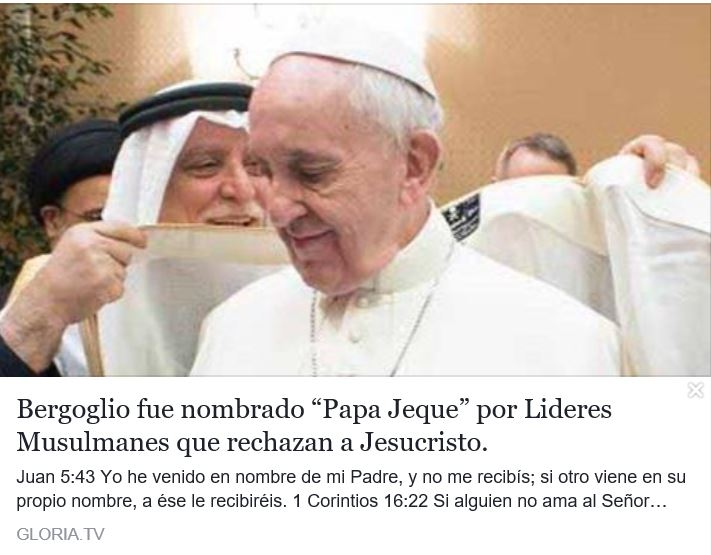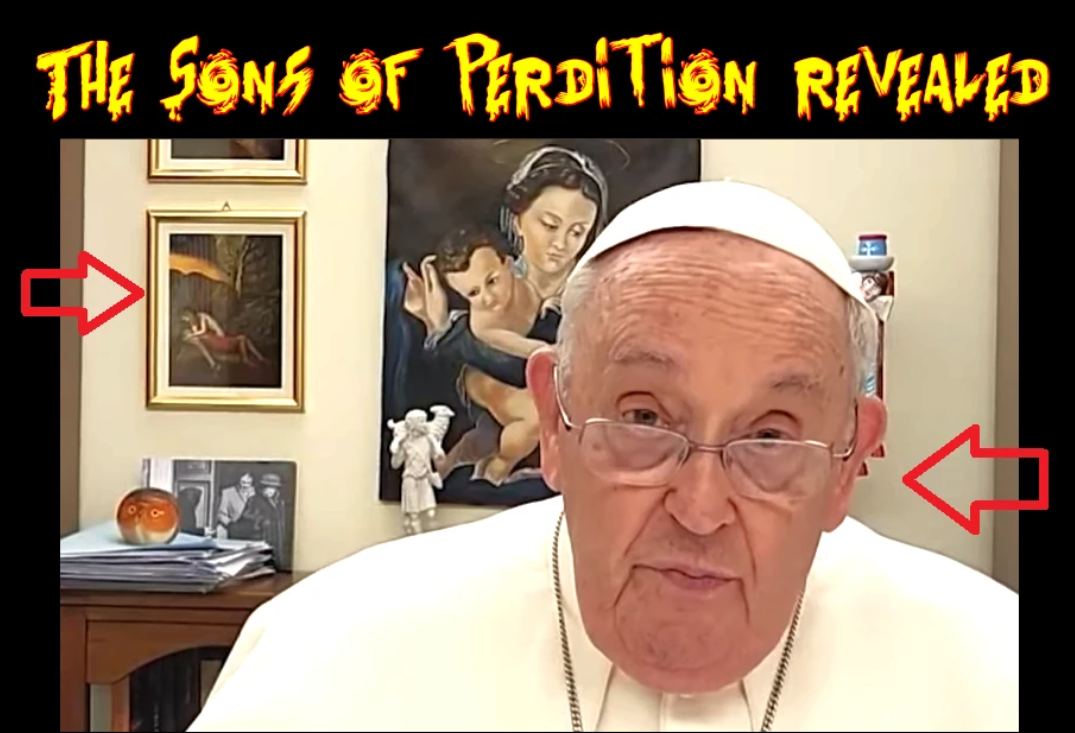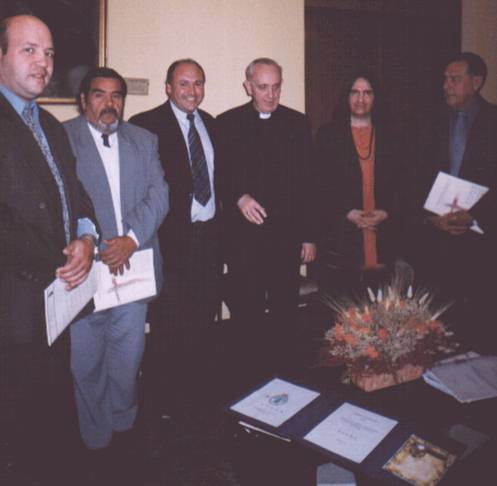 TIA: In one of his recent books – The Oil Has Not Run Dry: The Story of My Theological Pathway, published in November 2016 – Baum came out of the closet disclosing that he has been a homosexual for more than 50 years. He also confessed that he did not reveal it before to not harm the progressivist influence he exercised. As the saying goes, a bad tree cannot produce good fruits. Thus a progressivist and homosexual theologian cannot produce an orthodox document, which in its turn can only produce the bad fruits Nostra aetate has borne. Everything makes sense.
TIA: In one of his recent books – The Oil Has Not Run Dry: The Story of My Theological Pathway, published in November 2016 – Baum came out of the closet disclosing that he has been a homosexual for more than 50 years. He also confessed that he did not reveal it before to not harm the progressivist influence he exercised. As the saying goes, a bad tree cannot produce good fruits. Thus a progressivist and homosexual theologian cannot produce an orthodox document, which in its turn can only produce the bad fruits Nostra aetate has borne. Everything makes sense.60th Anniversary to “Nostra Aetate” which violates the First Commandment!Fr. John Zuhlsdorf: 28 October was 60th anniversary of Nostra Aetate, Vatican II’s Declaration on the Relation of the Church to Non-Christian Religions. The document was drafted in part by Fr. Gregory Baum (1923-2017). Baum left the priesthood and religious life, married a former nun, and admitted to having engaged in homosexual activity throughout his adult life beginning in 1963, during the Council.So now you know the other part of the story.
By their fruits you will know them.
Matthew 7:15
Beware of false prophets, who come to you in the clothing of sheep, but inwardly they are ravening wolves.

A false prophet is one who maliciously speaks lies in the name of God or the Church.
Apostate Robert Prevost on Nostra Aetate: "the Catholic Church rejects nothing that is true and holy in these religions, which “reflect a ray of that truth which enlightens all people”"
NCR: Gregory Baum a former Augustinian priest, Baum served the church as a theologian, sociologist, professor, author, journalist and advocate for interreligious dialogue, liberation theology and more progressive sexual ethics.
The intention of this article is to protect the faithful from being deceived.

Recently there has been a flurry of references to Gregory Baum, all of them laudatory. An article by Gregory Baum entitled “Vatican II - The Church in dialogue” appeared in the January-February issue if the Scarboro Missions magazine. This article is riddled with false doctrine.
None of these references make mention of the theological errors of Gregory Baum, yet he has done more than any person to harm the Church in Canada in my opinion. His Marxist background and activities are described in detail in a four-page bulletin “Herald of Freedom” April 6, 1974. It is entitled “Rev. Gregory Baum - Canada’s Marxist Pope.” In 1996, in a failed attempt to prevent his talk at the Newman Centre of the University of Toronto, I compiled a fourteen-page list of some of his errors entitled “Notes on Gregory Baum.”
It would take a large book to list and describe the errors and misconduct of Gregory Baum. Here I mention a few of them; there are many others.
Contraception
A focal point of Baum’s efforts was in opposition to the teaching of the Church against contraception. In 1964, Herder and Herder published the book “Contraception and Holiness.” It was presented as a “balanced perceptive declaration of Christian dissent”. Among the contributors were three professors of St. Michael’s College in Toronto: Gregory Baum O.S.A., Stanley Kutz C.S.B. (an admitted homosexual who later left the priesthood) and Leslie Dewart, an atheist. An article reporting an interview with Gregory Baum was printed in the Toronto Globe and Mail of April 9, 1966. It was entitled “Catholics May Use Contraceptives Now.” A year later Baum said that even if the Pope came out against contraception his decision would be irrelevant (Globe and Mail, 1967).
After the Pope’s encyclical Humanae Vitae reiterated the Church’s condemnation of contraception in 1968, Baum was like a whirling dervish in his hyperactivity against the encyclical. He spoke in Canada and in the United States. On August 1, 1968, the Globe and Mail had a feature article by him “Catholics May Follow their Conscience”. In the August 23 issue of the US Catholic Weekly Commonweal magazine, there was his article “The Right to Dissent”. The September issue of the Homiletic and Pastoral Review carried his “The New Encyclical on Contraception” where he attacked the Pope for going against the experience of vast numbers of Catholics and the witness of other Christian churches.
Homosexuality
Gregory Baum openly advocated same-sex “marriage”. In Commonweal for February 15, 1974, he wrote an article on homosexuality in which he declared that Catholic teaching on homosexuality would change and embrace homosexuality within a few years. Homosexual activists used this article as a handout for almost two decades throughout North America. In speaking to Dignity and other homosexual groups, he encouraged them to remain in the Church but to work for a change in the Church’s teaching.
Devotion to Mary
In the early sixties, I attended a dinner at Osgoode Hall under the auspices of the Catholic Lawyers Guild. Gregory Baum spoke on the exaggerated “Cultus” of Mary in the Catholic Church. He stated that there was no evidence of devotion to Mary before the fourth century. At the time, I had been reading a section of the book “Mariology” edited by Juniper Carol, O.F.M. on the “The Origins of Marian Cult”. It gave numerous examples of devotion to Mary in the first three centuries. Mary herself proclaims in the Magnificat (Luke 1: 46-55): “All generations will call me blessed.” Baum discouraged recitation of the Rosary.
Dissent and Rejection of Authority
Msgr. George Kelly wrote in “The Battle for the American Church” pp. 448-9: “Gregory Baum argued that Rome’s grip on the Church can be loosened by careful violation of law. In Baum’s view freedom from Rome’s law can be obtained by seizing it in the knowledge that violations will go unpunished.”
The Priesthood
I conducted about twenty of the first priest-laicization processes for the Archdiocese of Toronto. A number of priests said that they were encouraged to leave the priesthood by Gregory Baum. He promoted the concept of a temporary or “existential” priesthood. In an article printed in the Toronto Star of April 23, 1966, Baum stated that he was not alarmed at the large numbers of priests and religious departing from their vocations. He said “By assigning the laity a higher place in the Christian Church, the whole matter of the role of the clergy has to be re-thought.”
A Report to the Archbishop
I was pastor of St. John’s Church on Kingston Rd in Toronto in 1966. In the parish there was a convent of Notre Dame Sisters. I received a phone call from the Superior of the Notre Dame Sisters, who was in Ottawa. She told me that one of the younger Sisters, studying at St. Michael’s College, was obliged by Gregory Baum to attend a weekend retreat near Orangeville. This was before the mitigation of Friday abstinence. Meat was served on Friday evening. “The Sister said ‘Fr. Baum, this is Friday and you are serving meat’. He replied ‘Sister, here I am Pope. Eat your meat!’ In the course of the weekend, he encouraged immoral familiarities between male and female religious. You must report this to Archbishop Pocock”. I suggested that she report this to the Apostolic Delegate in Ottawa. “No,” she replied “Sister is in your parish and you should report it”.
The next day I made a report on the matter to Archbishop Pocock. He threw up his hands and said “What can I do?” I said he could suspend Baum. He did nothing and allowed Baum to continue teaching at St. Michael’s College for another nine years.
Suspension and Excommunication
When the Declaration on Certain Questions Concerning Sexual Ethics was issued by the Sacred Congregation for the Doctrine of the Faith on December 29, 1975, Gregory Baum criticized it severely. He said “The concept of sex only within marriage was no longer adequate. Even if marriage is the ideal, this does not mean there is no responsible context of sexual relations for mature single people, the widowed and the divorced.” In response, Archbishop Pocock suspended Baum from hearing confessions.
In the issue for January 14, 1978, the Catholic Register reported that “Gregory Baum, noted Canadian theologian and outspoken critic of the Church, married a former nun in a private ceremony recently in Montreal… the bride is Shirley Flynn, who left her religious order about fifteen years ago.” According to Canon 2388 of the Code of Canon Law in force at that time, Gregory Baum was automatically excommunicated.
It is difficult to understand why articles by Baum should continue to appear in Catholic periodicals; why he should be praised in others; why he should be invited to speak in Catholic institutions such as St. Paul’s University in Ottawa and why this arch-heretic should be highly praised in an interview given him recently by a Catholic priest currently posted on a website.
Vatican II Theologian
He made no secret of the intent with the documents of the Vatican II Council: "We have used ambiguous terms during the Council, and we know how we shall interpret them afterwards."
Father Eduard Schillebeeckx (1914-2009)
Vatican II Theologian
He made no secret of the intent with the documents of the Vatican II Council: "We have used ambiguous terms during the Council, and we know how we shall interpret them afterwards."
Cardinal Leo Joseph Suenens (1904-1996)
Liberal Cardinal that pushed Vatican II agenda
"Vatican II is the French Revolution in the Church."
Father Roca (1830-1893)
An apostate and excommunicated priest and former canon-lawyer
After being excommunicated he stated: "...the papacy will fall; it will die under the hallowed knife which the fathers of the last council will forge.” Roca also said: “You must have a new dogma, a new religion, a new ministry, and new rituals that very closely resemble those of the surrendered Church. The divine cult directed by the liturgy, ceremonial, ritual and regulations of the Roman Catholic Church will shortly undergo transformation at an ecumenical Council.”
Paul VI addressing the United Nations
Before the close of Vatican II, Paul VI traveled to the UN on October 4, 1965. He told the UN and the world: "The peoples of the earth turn to the United Nations as the last hope of concord and peace."


































.gif)







































